Table of Contents
Table of Contents
- 1. JAN-PRO Cleaning & Disinfecting
- 2. Coverall
- 3. Vanguard Cleaning Systems
- 4. Anago Cleaning Systems
- 5. Merry Maids
- 6. ServiceMaster Clean
- 7. Stratus Building Solutions
- 8. Buildingstars Commercial Cleaning
- 9. Jani-King
- 10. Chem-Dry
- What are the benefits of investing in a cleaning franchise?
- What challenges can you face as a commercial cleaning franchise owner?
- What should you look for when choosing a commercial cleaning franchise?
- How can Aspire help you manage your commercial cleaning franchise?
You want to run a cleaning business through franchising, but with so many options, it’s hard to know where to start.
The costs aren’t always clear, and the operational complexities are overwhelming.
Whether you want to offer basic janitorial services, spruce up office spaces, or do deep cleaning for residential homes, the franchises listed here are industry leaders.
This guide doesn’t just list them—it breaks down their franchise fee, overall investment, pros, and cons so you can make an informed decision.
1. JAN-PRO Cleaning & Disinfecting
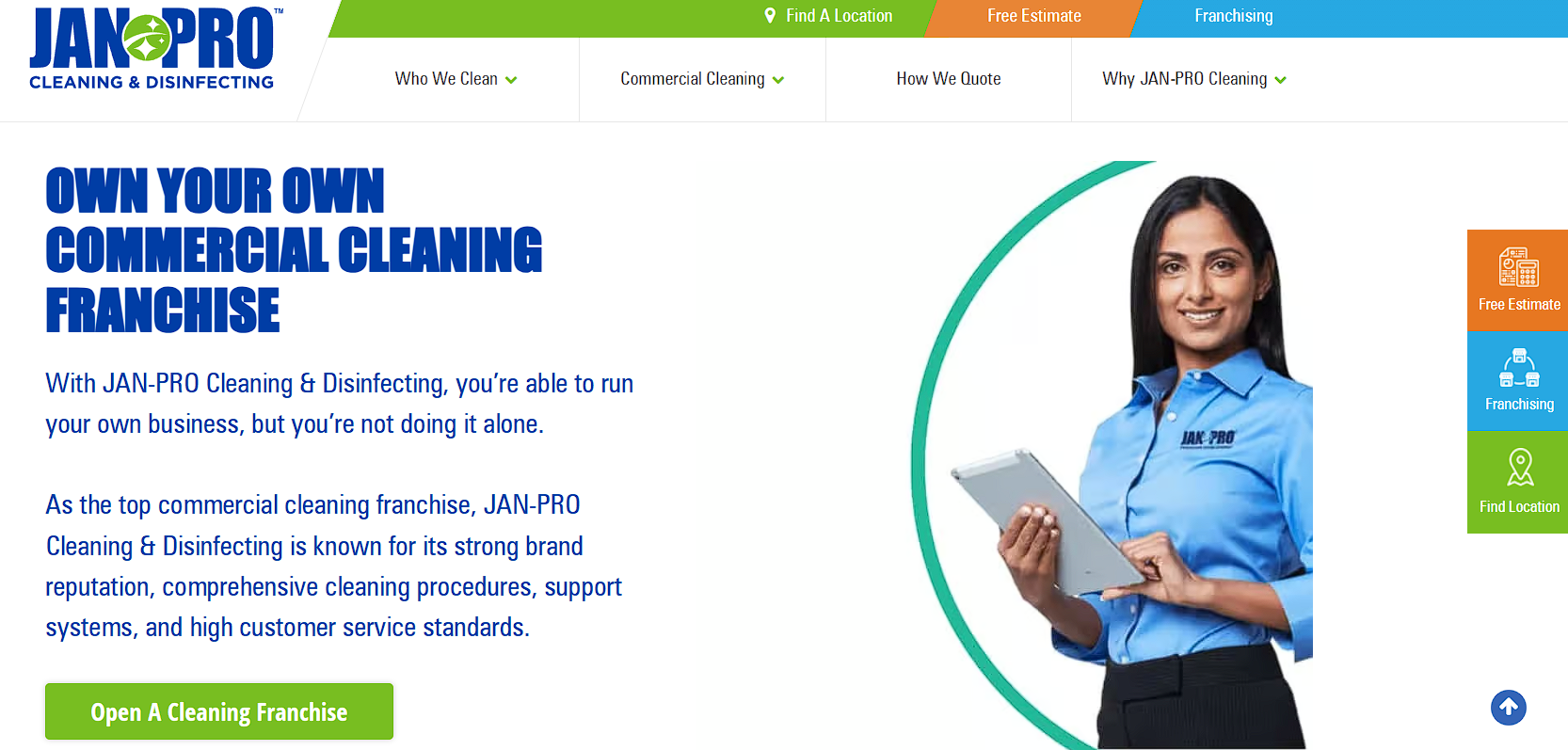
Image Source: JAN-PRO
Interested in commercial cleaning—malls, schools, industrial buildings, offices, and more? JAN-PRO offers a proven franchise model with financial incentives, comprehensive training, strong brand reputation, affordable initial franchise fees, tools, and ongoing support to help you succeed.
It has an established clientele, reputation, and recurring revenue model to ensure your cleaning business thrives.
JAN-PRO requirements:
Initial investment: $3,000-$58,000
Franchise fee: Starts at $1,250
Franchise development starter kit: $900
Additional costs: Insurance, equipment, and working capital
JAN-PRO pros:
Offers a five-course certification program to equip you with the skills to run your business and service account.
JAN-PRO has a dedicated team of sales professionals to help find clients, allowing you to deliver quality customer service.
Provides discounts for veterans, enabling them to grow their business.
JAN-PRO cons:
You are required to pay royalties and marketing fees, reducing your profit.
JAN-PRO’s start pack equipment covers basic cleaning services. You’ll need to purchase more equipment to provide additional service.
Despite low initial investment fees, additional costs depend on your business's location and size.
Best for: First-time entrepreneurs or experienced business owners looking to start a cleaning business with solid support systems and low entry fees.
2. Coverall
Coverall is a commercial cleaning company that offers health-based cleaning services to workplace facilities, government buildings, malls, and gyms.
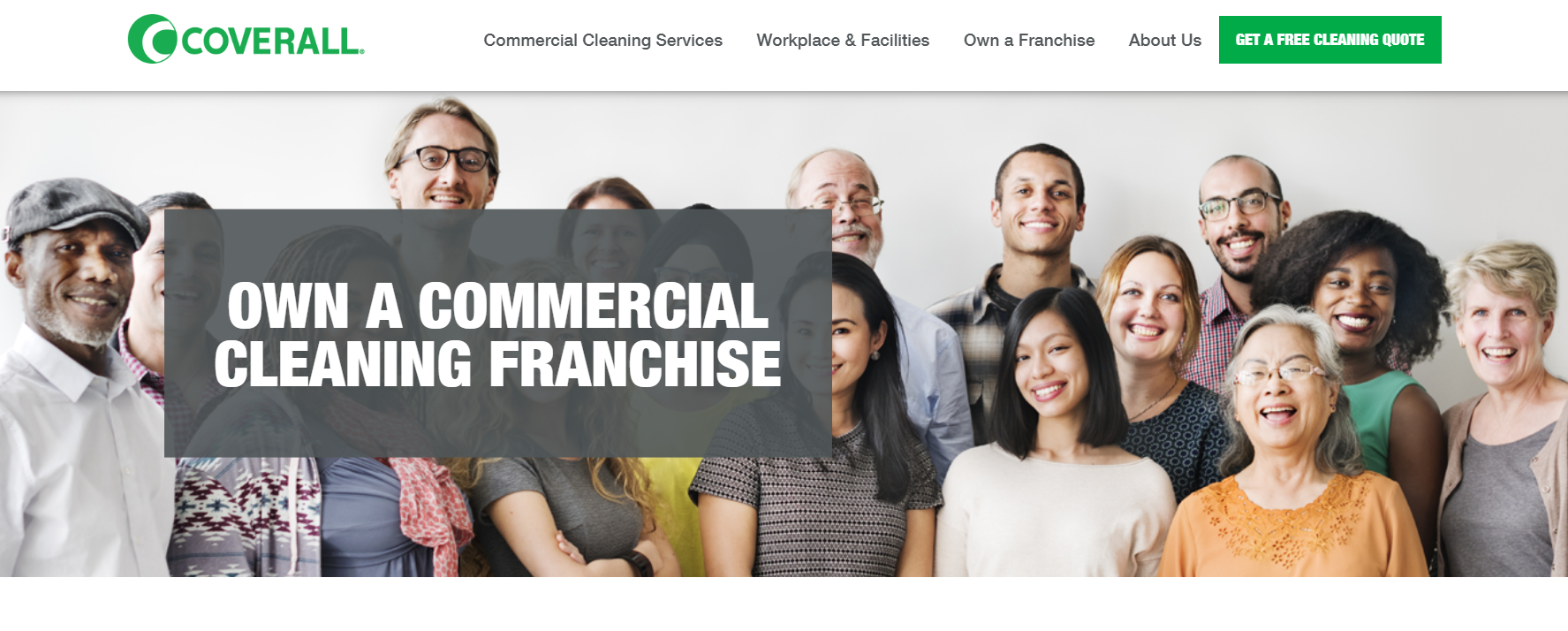
Image Source: Coverall
With over 40 years in the cleaning industry, they run a franchise model that allows entrepreneurs to operate independent cleaning businesses in North America.
Coverall is particularly known for the CDC-recommended cleaning training it gives its business owners, ensuring brand consistency across franchisors and franchisees.
Coverall requirements:
Initial franchise fee: $15,570-$40,320
Initial investment: $18,000-$52,000
Startup kits and supplies: $990-$2,550
Business registration, licensing, and insurance: $175-$1,500
Application fee: $85
Veteran incentive: 10% off franchise fee
Support fee: 10% of gross dollar volume
Royalty: 5% of gross dollar volume
Coverall requirements pros:
Offers financial assistance to entrepreneurs for up to 24 months.
Provides scholarships to children of independent franchise business owners.
Coverall gives business owners a roadmap to growing their franchises with no experience required.
Coverall cons:
You have to pay a separate fee to apply as a franchise.
The length of its initial franchise term is up to 20 years, which is quite long.
Considering Coverall’s audience, constant effort is needed to secure new clients and maintain current ones.
Best for: First-time or experienced business owners looking to expand into the commercial cleaning industry.
3. Vanguard Cleaning Systems
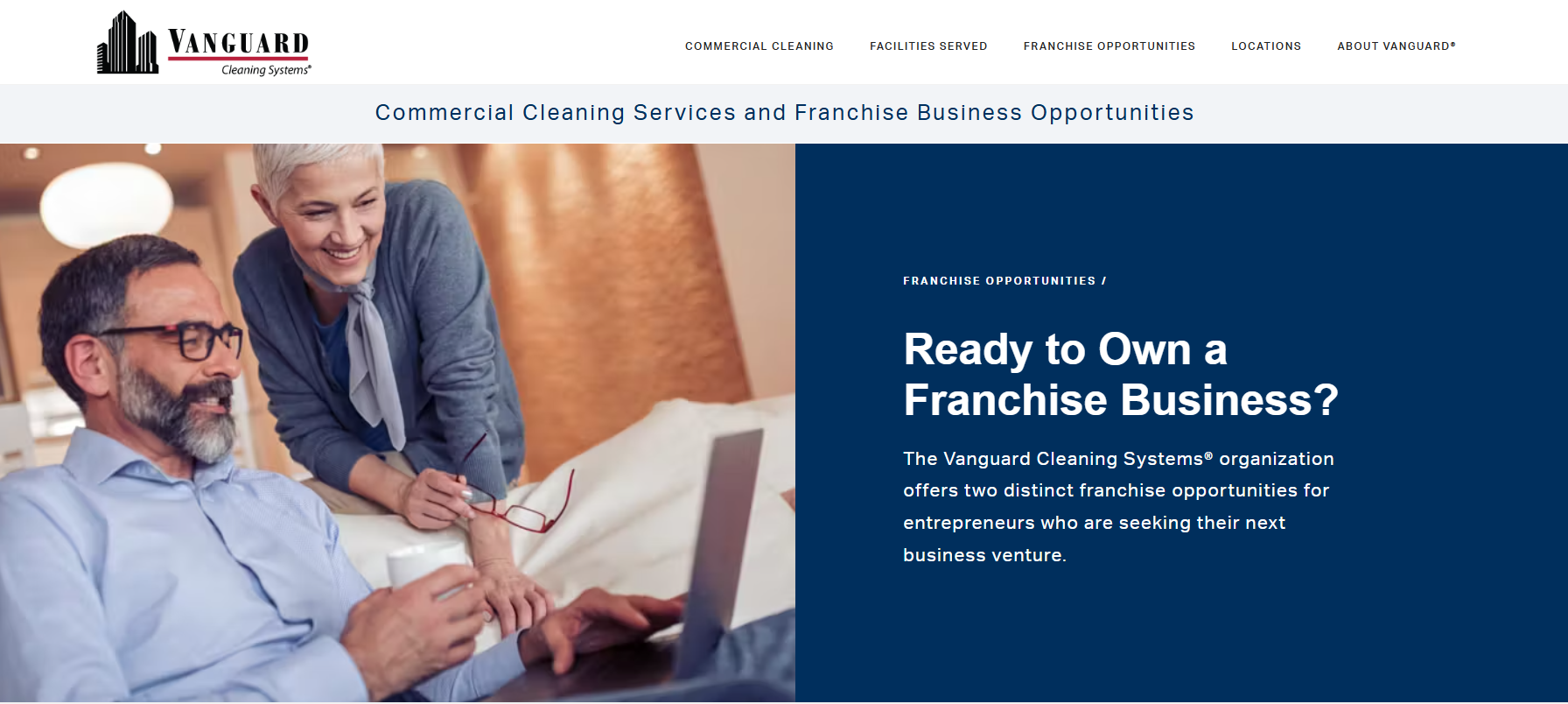
Image Source: Vanguard Cleaning Systems
This commercial cleaning service offers three forms of franchise opportunities for entrepreneurs:
Janitorial franchise business: This is for owners who want to run their cleaning company independently, providing excellent services, hiring staff, and managing operations.
Area Franchise business: For business executives who want to manage a cleaning service and support janitorial franchise businesses.
Veteran Franchise business: This is for ex-military individuals interested in owning a cleaning franchise.
Vanguard Cleaning requirements:
Initial franchise fee: $5,000+ (Janitorial franchise), $100,000-$350,000 (Area franchise)
Minimum liquid assets: $500,000 for an area franchise business
Networth: Area franchise businesses need $1 million, and janitorial, $50,000-$250,000
Vanguard Cleaning Systems pros:
It allows executives to run regional franchise businesses using an established business model.
Offers extensive onboarding programs to executives.
Area franchise owners can access customized digital tools for managing account contacts, marketing materials, accounting, and cash management.
Vanguard Cleaning Systems cons:
Independent janitorial services receive less business support than Vanguard provides to area executives.
The net worth amount and the janitorial franchisee's needs are quite high.
The cost to purchase a Vanguard janitorial franchise isn’t readily available on their platform.
Best for: Experienced business owners looking to scale their commercial cleaning business.
4. Anago Cleaning Systems
Anago offers business franchises (called unit franchises) to cleaning professionals interested in starting their own janitorial service. With over 30 years of experience in the industry, it supports these unit franchise owners with the support, training, supplies, and finances to help them get started.
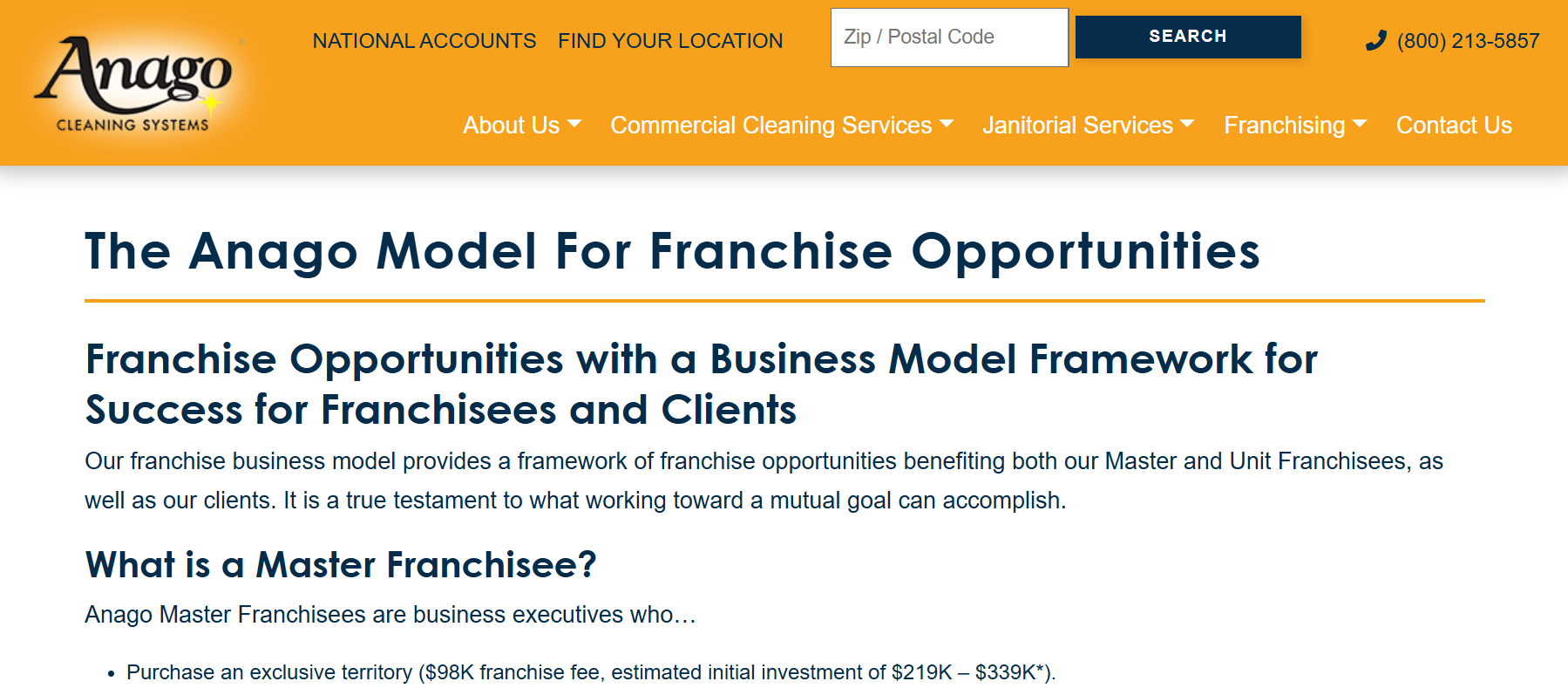
Image Source: Anago Cleaning Systems
For business-oriented professionals, Anago also offers master franchises. Master franchisees manage multiple unit franchises within a region and provide them with complete business support.
Anago Cleaning Systems requirements:
Initial investment: $10,440 for unit franchise owners, which includes orientation and a supply package. Master franchises, on the other hand, need to pay between $219,000 and $339,000.
Office space: Master franchises need 1,000 square feet of office space, while unit franchises can operate their businesses from home.
Employees: Master franchises need at least an Administrative Assistant to start their business.
Minimum net worth: $500,000 for master franchise and $4,590 for unit franchises.
Liquid assets: At least $250,000 and $1,000 for master and unit franchise, respectively.
Royalty fee: 10% on gross revenue for unit franchises and 5% on collected revenue for master franchises, including a 1% admin support fee and a $400 flat fee per unit franchise sold.
Anago Cleaning System pros:
Anago provides financial assistance to unit franchise owners and supplies packages to help them hit the ground running.
It hosts an intensive three-week orientation program for franchisees, equipping them with the practical skills and knowledge to run their businesses.
Offers a 10% discount on initial investment fees to veterans.
Anago Cleaning Systems cons:
The overhead cost for launching a master franchise is relatively high, with other administrative fees involved besides the initial investment.
According to their disclosure document, franchises will keep paying royalties and fees even if they lose money.
Once your franchise agreement ends, you may not be allowed to run a similar business again.
Best for: New entrepreneurs and experienced business owners looking to start a business with a defined structure.
5. Merry Maids
Merry Maids is a residential cleaning company that provides deep cleaning services to homeowners and renters. It operates a franchising model that lets businesses sell customizable cleaning services to customers.
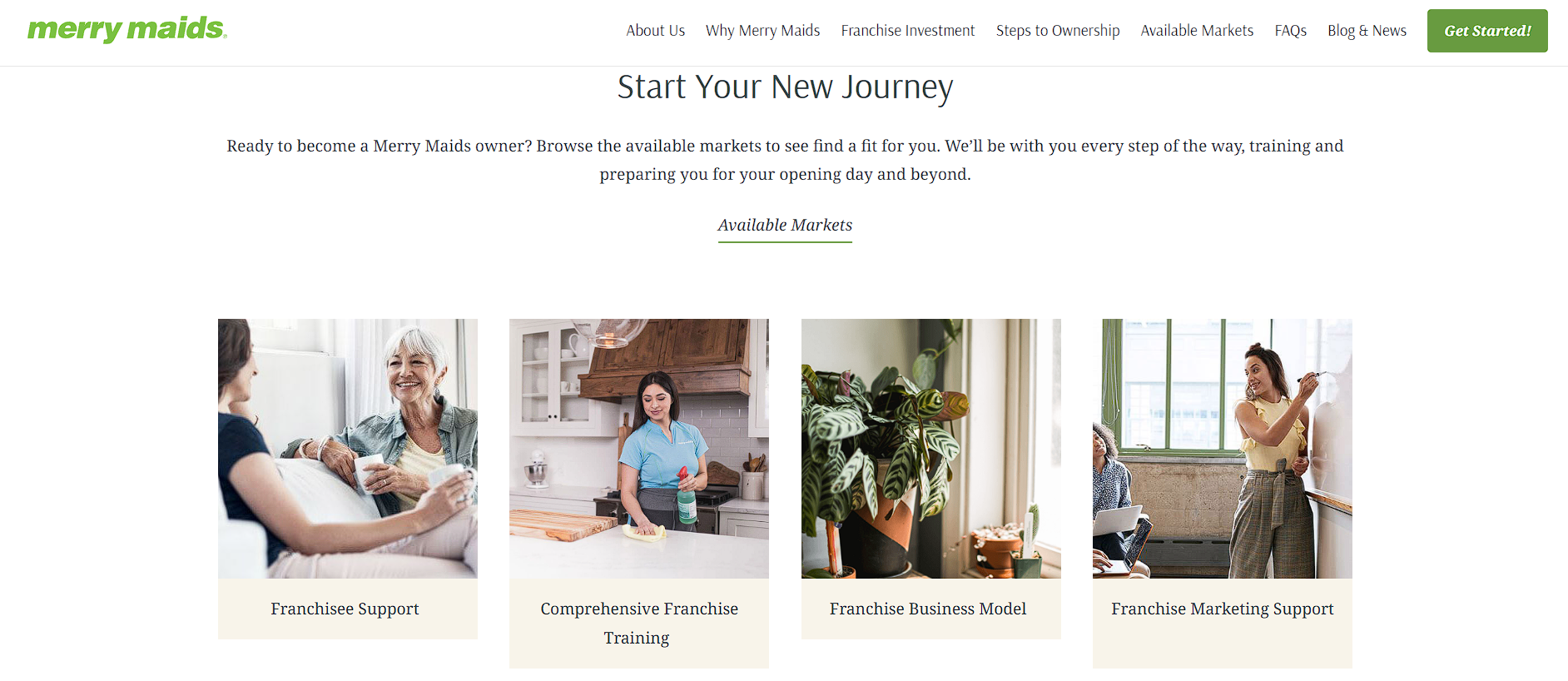
Image Source: Merry Maids
With their model, clients have different plans to choose from–one-time, weekly, bi-weekly, or monthly cleaning services. This way, the cleaning business accommodates clients’ schedules.
Merry Maids requirements:
Initial investment: $94,480-$144,425, depending on your territory size.
Franchise fee: $37,000-$55,000 due when signing franchise agreement.
Opening inventory packing expenses: $6,500 to $8,000
Marketing deposit: $6,000 will be paid when signing the franchise agreement.
Office space: A minimum of 450-1800 square feet of space is required for the business.
Liquid capital: A minimum of $50,000
Royalty fee: 7% of gross sales paid to Merry Maids weekly.
Merry Maids pros:
Financing options for prospective investors.
Discount offers for veterans, women, and minorities.
Proprietary software and service mobility software to help franchisees automate job management and information distribution.
Merry Maids cons:
New franchisees must travel to Memphis, Tennessee, for the company’s training course.
While financing options are available, Many Maids' initial investment is high.
Requires franchisees to own or rent an office space.
Best for: Entrepreneurs with management and customer service skills who are interested in starting a cleaning business.
6. ServiceMaster Clean
ServiceMaster Clean is one of the most established cleaning service businesses, with over 70 years of experience. The brand specializes in specialty cleaning, janitorial, disinfection, and customized cleaning solutions.
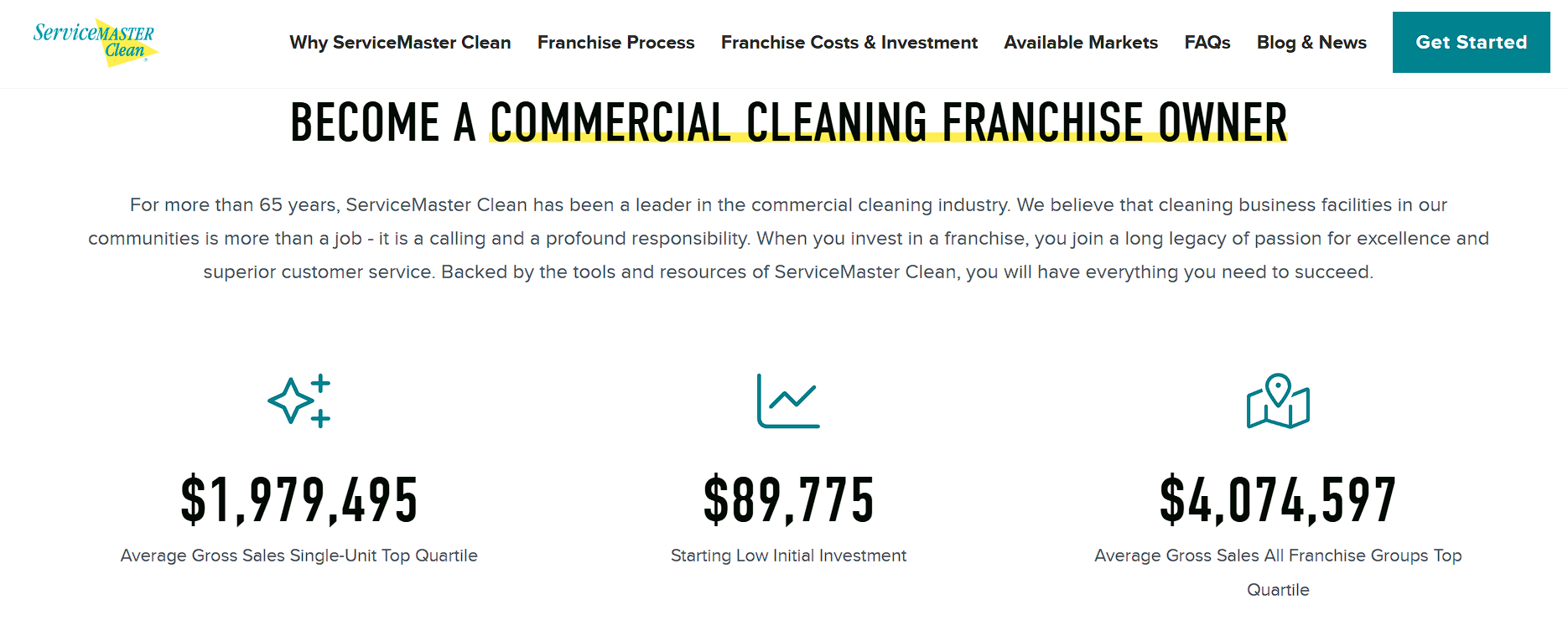
Image Source: ServiceMaster Clean
With over 1,200 franchises in the U.S. and beyond, ServiceMaster provides franchisees with strong support and an extensive network to help them succeed in the cleaning industry.
ServiceMaster Clean requirements:
Franchise fee: $32,000, paid in full when you sign the franchise agreement.
Net worth: New investors should have a minimum of $100,000.
Liquid capital: Franchisees need a minimum of $50,000.
Initial investment: Depending on your chosen business format, it costs $89,995- $131,200. This includes equipment, certification, materials, and other business-related expenses.
Discounts: The franchise fee is 20% discounted for veterans, while it is 10% for women and minorities.
ServiceMaster pros:
Offers commercial cleaning services to different industries, enabling investors to spread their wings.
Substantial brand recognition that attracts prospects to franchisees.
Extensive sales training opportunities and networking groups for new investors.
ServiceMaster cons:
You might be competing with other franchises, depending on the size of your market area.
Unlike other business franchises, ServiceMaster requires franchisees to generate leads and grow their business.
Expensive franchise fees.
Best for: Cleaning service technicians or sales, marketing, and business professionals who want to become their own boss.
7. Stratus Building Solutions
Stratus Building Solutions operates a green commercial cleaning business franchise for small business owners and executives.
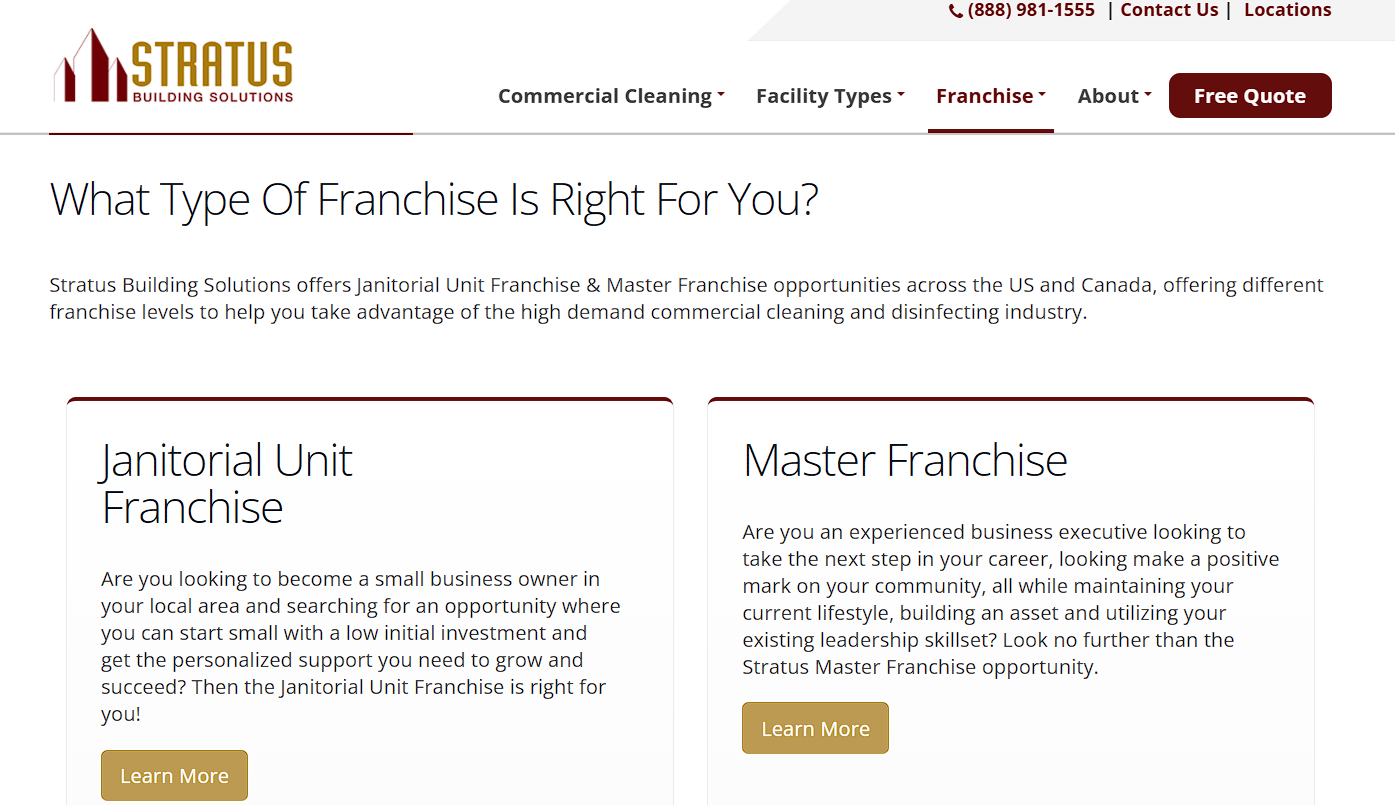
Image Source: Stratus Building Solutions
Small business owners are eligible for Stratus’s janitorial unit franchise, which allows them to start a local business with a low buy-in.
For business executives, Stratus offers the master franchise option, which enables them to use their leadership skills by managing unit franchises in their area.
Stratus Building Solutions requirements:
Initial investment: Depending on the territory to be purchased, the initial investment is about $1,000 for janitorial franchises and $53,800 for master franchises.
Franchise fee: $75,000+ for Master Franchise
Working capital: $100,000 for Master Franchise
Stratus Building Solutions pros:
Branded Stratus Green Clean products to start your business offering an eco-friendly janitorial service experience.
Runs a business model that benefits both master and janitorial franchisees. Masters manage business contracts while janitorial handles the cleaning.
Offers cleaning services across different niches–carpet, post-construction, medical facilities, and more.
Stratus cons:
Prospective regional (master) franchisees need $100,000 in working capital, which is a huge investment considering other fees required.
Janitorial franchisees need other franchisees (masters) for support. This could be frustrating if both parties are still learning the ropes.
Investment fees ultimately depend on the population of a franchisee’s territory.
Best for: Entrepreneurs who want to invest in eco-friendly businesses.
8. Buildingstars Commercial Cleaning
Buildingstars is similar to Stratus, offering franchising opportunities to new entrepreneurs and business executives.
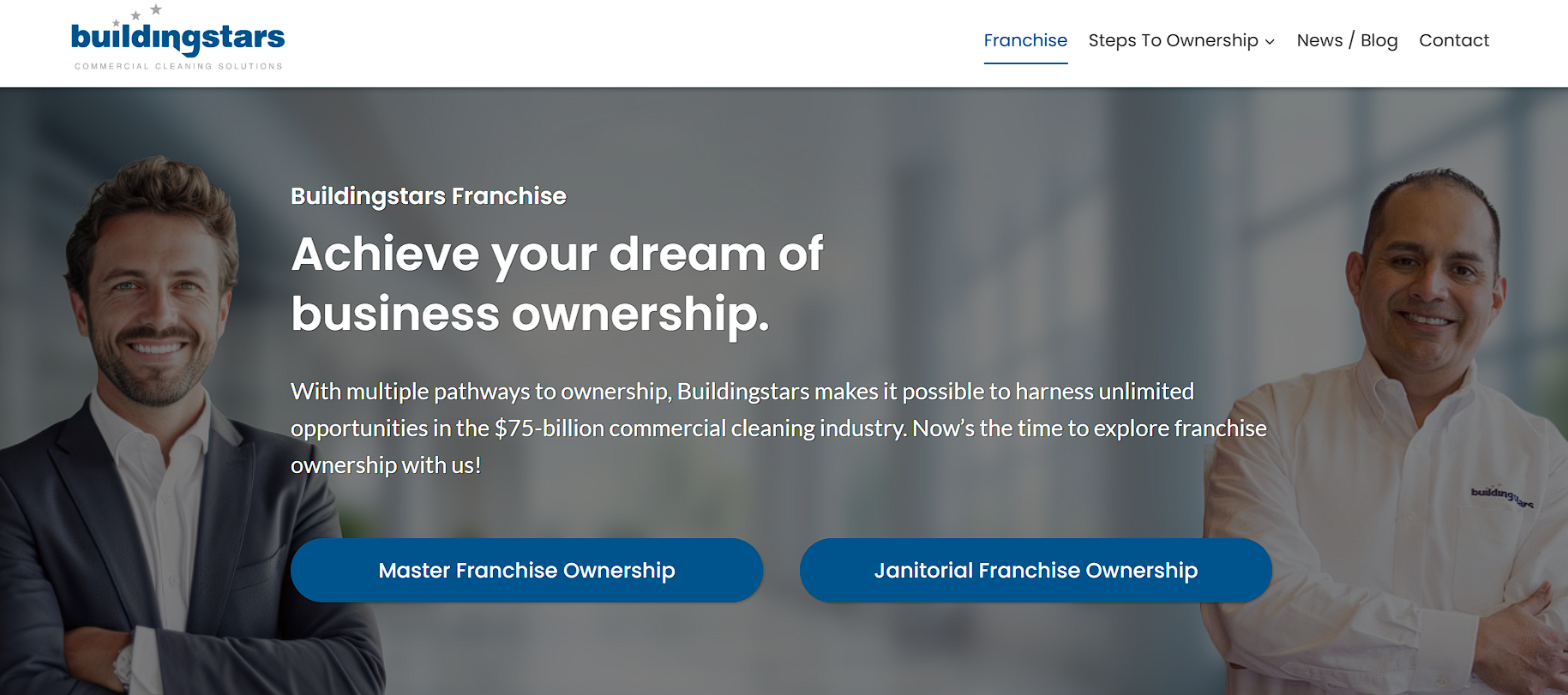
Image Source: Buildingstars Commercial Cleaning
The difference, however, is that Buildingstars provides cleaning services to commercial, industrial, and medical businesses. It also boasts one of the largest franchise options in the market, ‘The Corporate,’ which targets high-quality cleaning accounts.
Its unit franchise focuses on office buildings, allowing business owners to keep a flexible schedule.
Master franchises, on the other hand, are responsible for supporting janitorial franchise owners and building a sales force.
Buildingstars Commercial requirements:
Initial investment: Begins with $795 for a janitorial franchise owner and $145,700-$320,500 for master franchise owners.
Net worth: $2-5 million
Credit score: 720+
Liquid capital: $500,000 liquidity
Royalty fee: 10% of gross sales, paid monthly.
Buildingstars Commercial pros:
Provides unit franchises with an initial client base and customer service to clients.
Hosts an annual convention for peer networking.
Offers ongoing support and training to janitorial and master franchisees.
Buildingstars Commercial Cleaning cons:
Franchise renewal comes at a cost and is no guarantee that owners will secure the same deal as before.
Franchisees are required to pay a monthly management fee.
The master and corporate franchise options are expensive and demand a long career background and B2B service sales experience.
Best for: Intending entrepreneurs, business professionals, and executives with years of working experience who are interested in building a cleaning business.
9. Jani-King
Founded in 1969, Jani-King is one of the oldest commercial cleaning businesses. But what sets it apart is its global presence, boasting cleaning services and franchises across five continents.
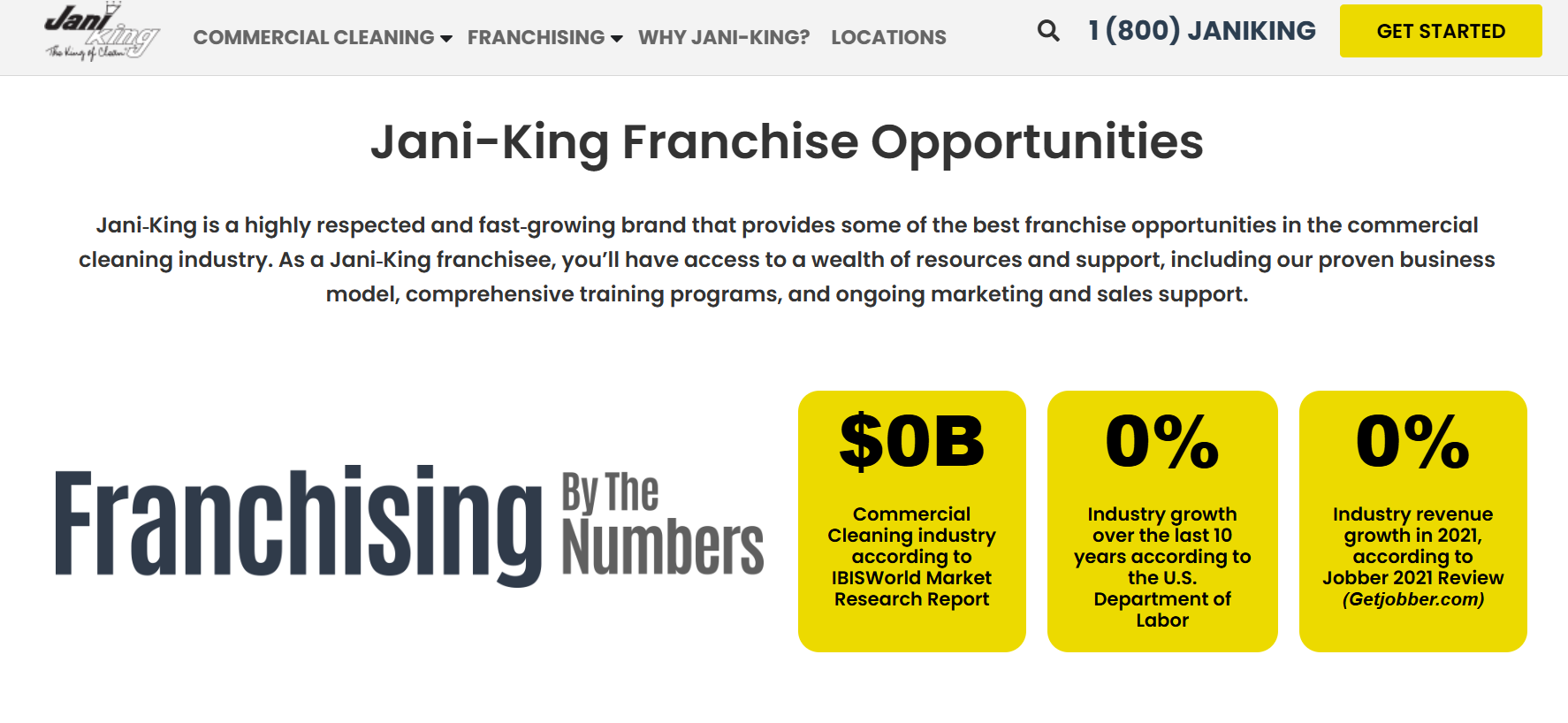
Image Source: Jani-King
Jani-King operates three franchising options:
Unit franchise: Small business owners who want to run their commercial cleaning business.
Domestic franchisor: Investors who will operate a business within a defined territory in the U.S. and sell Jani-King unit franchises and cleaning contracts.
International franchisor: Global entrepreneurs who want to run an exclusive Jani-King cleaning business in a city or country of choice.
Jani-King requirements:
Initial investment: $10,500-$223,500, including startup costs, franchise fees, initial inventory, equipment, real estate, and initial operating expenses.
Liquid assets: $20,000-$50,000
Net worth: $100,000-$300,000
Royalty fee: 10% of monthly gross
Advertising: 1.5% of monthly gross
Jani-King pros:
It’s an established brand with global influence, so it can help franchisees attract clients quickly.
Domestic franchisors get a 20-year franchise agreement.
Provides franchisees with cutting-edge equipment to deliver quality service.
Jani-King cons:
High fees: Jani-King charges a 7% accounting and sales fee, which is a lot for small businesses.
Limited flexibility: Running a Jani-King franchise requires full commitment compared to other franchises.
Limited financial disclosure: Jani-King doesn’t provide full details on franchisee investment or finances, making it difficult for prospective business owners to gauge their readiness or potential earnings.
Best for: Business professionals who want to establish a global presence.
10. Chem-Dry
This next cleaning service specializes in carpet cleaning and brands itself as North America’s best.
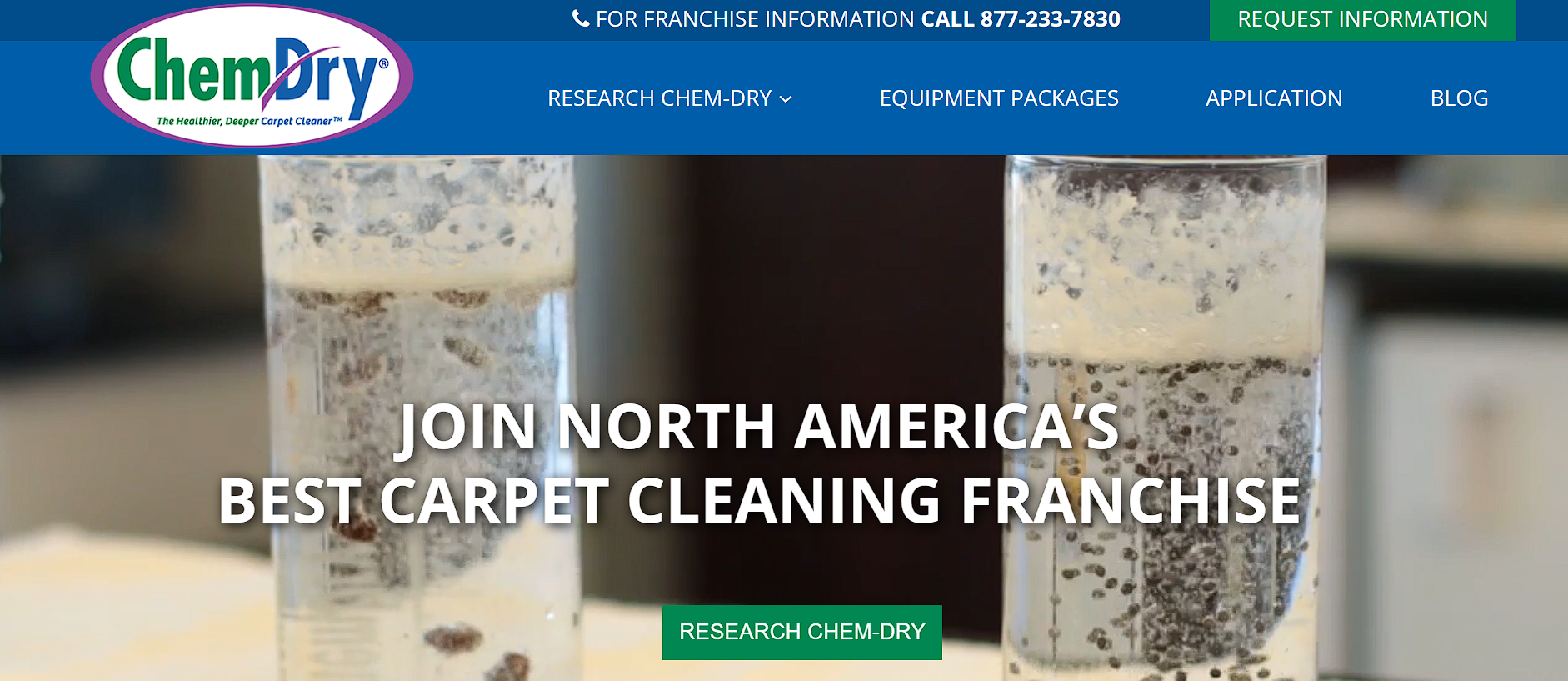
Image Source: Chem-Dry
Beyond carpets, they offer upholstery, leather, odor removal, and grout cleaning for different commercial spaces.
What sets Chem-Dry apart is its carbonation-based cleaning process, which uses less water to remove dirt from carpets. This eco-based approach has fueled expansion, enabling it to offer franchising opportunities.
Chem-Dry requirements:
Initial investments: Under $125,000, depending on your preferred equipment type and van.
Liquid capital: $50,000-$100,000 in liquid cash.
Net worth: Minimum of $70,000-$90,000.
Chem-Dry pros:
Financial assistance is available to franchise owners.
Provides a flexible training program that operates a hybrid model.
Established authority in the carpet cleaning industry, making it easy for franchisees to attract new clients.
Chem-Dry cons:
Chem-Dry’s agreement is for 5 years, which is short compared to other cleaning companies.
Franchisees must pay royalties and advertising fees, reducing the overall profit.
Franchisors retain the right to terminate the agreement and prevent the franchisee from running a similar business.
Best for: Entrepreneurs looking for a scalable, eco-friendly business with strong support.
What are the benefits of investing in a cleaning franchise?
You’ll be stepping into a tested and trusted system—no guesswork, just a streamlined path to building your cleaning business without starting from scratch.
Here are other benefits of investing in a cleaning franchise:
Extensive training: Business experience isn’t a requirement with most business franchises. They have a robust training program to guide newbies through business operations, marketing, custom cleaning strategies, customer service, and more.
Existing clientele: Some franchises jumpstart your success by connecting you with new clients so you focus on growing the business instead of chasing leads.
Access to proprietary software: Many business franchises have specialized digital tools for scheduling, employee monitoring, appointment booking, and invoicing. These tools enable franchisees to manage their business from a centralized location instead of switching between multiple apps.
Earn customers’ trust: Cleaning franchises are popular brands people know and trust. This gives prospective franchise owners an edge in a competitive market.
What challenges can you face as a commercial cleaning franchise owner?
One recurring challenge with cleaning franchise partnerships is the restrictions that apply after the agreement ends. These limitations make it difficult to branch out and grow an independent business in the long run.
Secondly, besides the initial investment for most franchises, there are other fees—royalty, marketing, management software, etc.—to pay that will eat into your profits.
Flexibility is also limited as a franchisee. You’re concerned about meeting franchisors’ requirements and local client needs, which do not often match up. This eventually leads to frustration and termination of the agreement in some cases.
Another challenge you'd face is local competition—from other cleaning business franchises, yours, and independent cleaning businesses. You must stand out by offering specialized services or leveraging an engaging marketing approach.
Lastly, limited independence is an issue for many franchisees. Considering you’re the franchisor’s brand and reputation, you must stick with their principles, cleaning methods, and marketing style, limiting your creativity.
What should you look for when choosing a commercial cleaning franchise?
Think of it as picking a dance partner. You want to select one who is a good match for your moves.
Moves, in this case, could be specialized services the company offers. Interested in eco-friendly approaches? Check if the franchise has an eco-cleaning solution. Do you prefer cleaning healthcare facilities? See if it’s listed in their services.
You also want to confirm the franchise:
Features good training and ongoing support: New and experienced business owners benefit from a robust training system that familiarizes them with the franchise’s style and equips them with the skills to leverage the company’s tools and approaches to drive results.
Offers services that match the needs of your local area: If there aren’t many healthcare facilities in the area and you choose a cleaning franchise with that specialty, the business will not succeed. Before investing, go through their website to confirm the different cleaning solutions provided.
Provides a dedicated tool for management: Ensure the franchise has a digital system for effective business management. You know—to assign projects to workers, track project progress, record clients’ work history to provide personalized service, and send invoices.
Aspire is a business management tool that does all that and more. See how Aspire helps manage your cleaning business below.
How can Aspire help you manage your commercial cleaning franchise?
Streamlining the business operation enables you to manage your workflows from a centralized location.
Instead of switching between tools, Aspire lets you take charge of the cleaning business using advanced tools to simplify processes.
To be more specific, here’s what Aspire does:
Simplify processes: Monitor your business’s capacity or operations and create a work schedule using Aspire’s cleaning scheduling software. Share work itineraries and schedules with the team without leaving the platform. Cleaners can clock in and out, improving accountability and productivity.
Dana Shaw, Operational Strategy Manager at Property Works, describes the scheduling tool as a huge win for their cleaning company.
He says, “There are so many aspects of the system you can touch from the schedule board alone. You can easily see time, payroll, purchasing, invoicing, and cash flow—just in that epicenter, we're running the core aspects of our business right there.”
Improve profit margin: Aspire reporting software monitors productivity, costs, and profitability. This allows you to track services generating the most revenue and the hours workers spend, simplifying data-driven decisions.
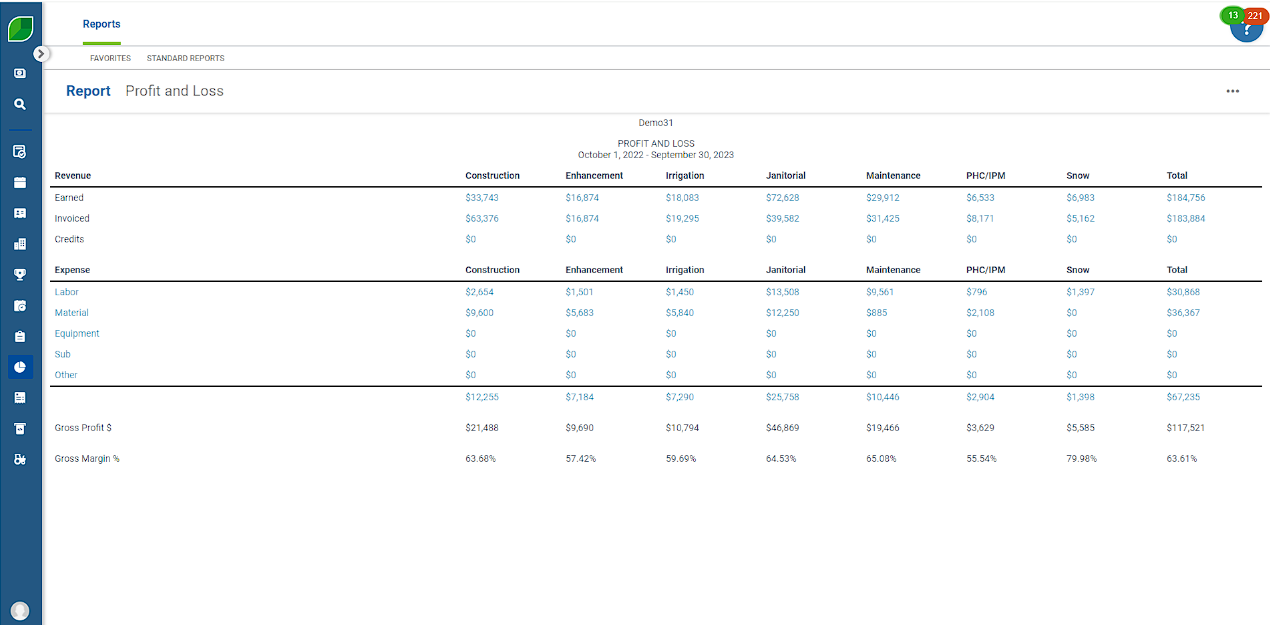
There’s also the job costing tool, which provides insight into the labor cost for each project. It lets you identify the top guys and projects bringing in the most revenue.
Manage customer relationships: Maximize revenue potential from existing customers with Marketing Pro. This Aspire integration lets users build hyper-targeted campaigns for both email and direct mail.
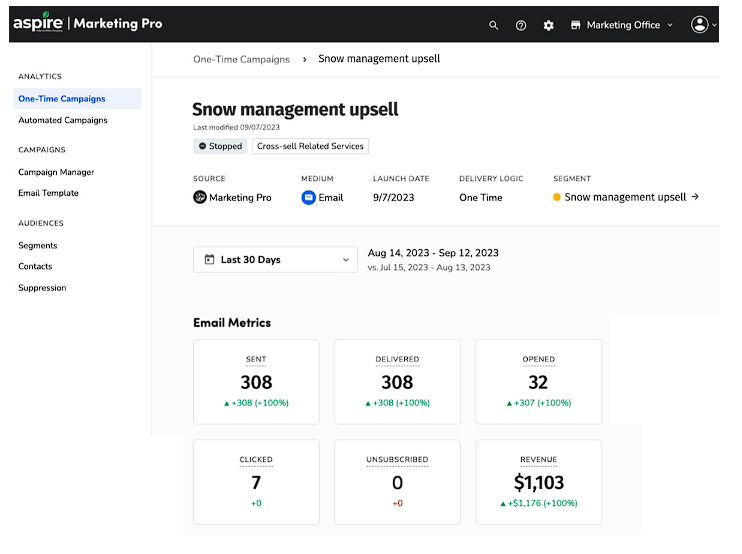
With a more segmented audience, sending targeted, personalized messages becomes easier, using data such as property size or value.
Inventory management: Aspire helps ensure the team never runs out of cleaning supplies and equipment never breaks down with equipment management software. This tool analyzes equipment lifespan, creates maintenance schedules, and sets reminders for upcoming repairs or restocks.
Here’s what Shaw had to say about this tool:
“I would argue that a company could better take advantage of Aspire if they were to manage their inventories through the system, so the team leader out in the field can actually allocate materials from their mobile phone onto the ticket as the teams are cleaning.”
Workforce management: Aspire's mobile app connects field and office workers. Cleaners can clock in and out, report issues, share notes with the team, and manage equipment inventory all from the app.
Property Works used Aspire for three months and witnessed a 35% growth in their business.
Shaw says, “We had tremendous growth month over month over month. We could see it in real time because Aspire affords you that visibility into your sales and your operations.”
Want to experience similar growth with your cleaning franchise as Shaw did with their business?
Book a free demo with Aspire today!



![Landscaping Business Due Diligence: Complete Guide [2025] Landscaping Business Due Diligence: Complete Guide [2025]](http://images.ctfassets.net/3cnw7q4l5405/6FhiPCf8mCcAawEddWnUXm/69ff3b97b13c1f0ca6f6d956adc2dd07/Landscaping_business_due_diligence__complete__guide_-2025-.png)
![How to Hire a Bookkeeper for Landscapers: Full Guide [2026] How to Hire a Bookkeeper for Landscapers: Full Guide [2026]](http://images.ctfassets.net/3cnw7q4l5405/5AbVDtokUcXVBR3HYotDM8/dcafa256d702a0e2a4fa432e9de43fb7/How_to_hire_a_bookkeeper_for_landscapers.png)


